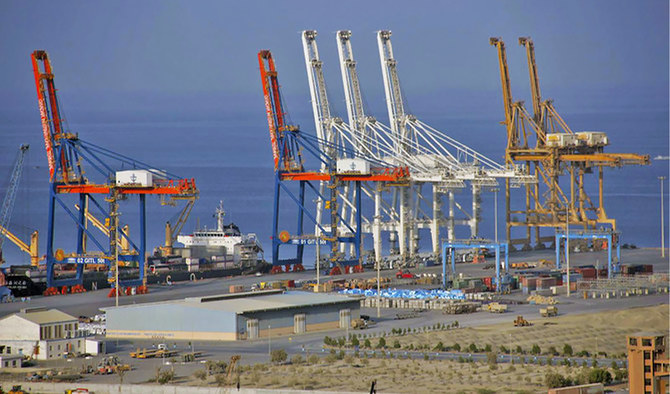ISLAMABAD: Khalid Mansoor, the chairman of the China-Pakistan Economic Corridor (CPEC) Authority, has said Chinese companies were not satisfied with Pakistani state institutions and their pace of work on the multi-billion-dollar economic corridor, Pakistani media reported on Friday.
Mansoor’s comments came during a meeting of the Senate Standing Committee on Planning and Development.
CPEC has seen Beijing pledge over $60 billion for energy and infrastructure projects in Pakistan, central to China’s wider Belt and Road Initiative (BRI) to develop land and sea trade routes in Asia and beyond.
But work has slowed down due to the coronavirus pandemic and reported disagreements over payment frameworks and loan restructuring for a number of projects. Attacks by Pakistani militant groups on Chinese officials and workers have also stepped up in the last few months.
During Thursday’s meeting of the Senate committee, its participants expressed concern over the slow pace of projects and dissatisfaction by Chinese firms over negligible progress in the past three years, Pakistan’s Dawn newspaper reported.
Committee chairman Saleem Mandviwalla said the Chinese were not satisfied with the pace of work and the CPEC portfolio had shown no progress in the last three years.
“They are crying”, Mandviwalla was quoted by Dawn as saying. “Chinese ambassador has complained to me that you have destroyed CPEC and no work was done in the past three years.”
Dawn reported that Mansoor, present at the meeting, agreed with Mandviwalla, saying he himself was not “satisfied with the progress of work on Gwadar airport and assured the panel that things were now on recovery mode.”
Mansoor was appointed to the CPEC authority last month, following the resignation of General (r) Asim Saleem Bajwa.
On Thursday, he briefed the Senate committee on issues faced by Chinese companies in terms of compliance with investment and agreements for CPEC’s Phase-1 power projects.
These included payment issues of independent power projects (IPPs), long outstanding dues, establishment of a revolving account for automatic payments and an increase in withholding tax (WHT) on sponsor dividends post investment from 7.5 percent to 25 percent, according to the report.
The PM’s aide said the authorities had planned to set up an investment facilitation center to offer One-Window Operation to all Chinese investors, adding that 135 Chinese firms were operating in Pakistan on CPEC and other projects and their top priority now was to revive the confidence of those working on CPEC.
On the financial and physical progress of all major CPEC projects, the committee was informed that 21 projects worth $15.7 billion had been completed. Of these, 10 were power projects of 5,320 megawatts and a high-voltage direct current (HVDC) transmission line worth $9.6 billion, five infrastructure projects worth $5.8 billion, two projects relating to the Gwadar Port and Free Zone and City Master Plan worth $300 million, and four were socio-economic development projects amounting to $140 million.
A total of 31 projects amounting to $9.3 billion were under implementation and 36 projects worth $28.4 billion were in the planning stages, the report said.
Last month, a suicide bomb attack on a motorcade carrying Chinese personnel injured one Chinese national and killed two local children. The incident took place on the East Bay Expressway in the southern port of Gwadar.
Gwadar is in the southwestern province of Balochistan, where separatist militants have waged a long-running insurgency. It is also at the heart of China’s CPEC investment in Pakistan.
In July, a suicide bomber attacked a bus carrying workers to a dam construction site in northern Pakistan, killing 13 people, including nine Chinese nationals.
Pakistan’s foreign minister said Pakistani Taliban militants known as Tehrik-e-Taliban Pakistan were behind that attack. The TTP has denied it was involved.
















